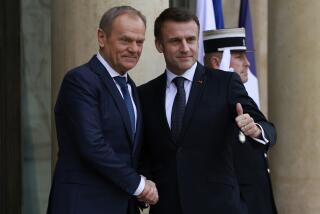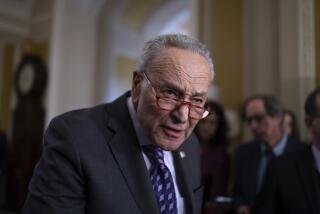German rival of Chancellor Merkel vows to remove U.S. nuclear weapons from the country
In a bid to jump-start his flagging campaign to lead Germany, Martin Schulz of the center-left Social Democrats has made a startling campaign promise, saying he would remove U.S. nuclear weapons from the country if he became chancellor.
Feeding on widespread fears among Germans of a possible conflict after President Trump’s recent exchange of tough talk with North Korea, Schulz ratcheted up his anti-nuclear weapons language at a campaign rally late Tuesday.
He called for the removal of about 20 U.S. nuclear warheads that according to German media reports are believed to be stationed in the western part of Germany — until now largely forgotten vestiges of the Cold War that ended nearly 30 years ago. Government officials have not confirmed the presence of nuclear warheads in Germany.
“As chancellor, I’d push for the ejection of nuclear weapons stored in Germany and if they’re stationed in this state of Rhineland-Palatinate, then for the removal of those weapons here,” Schulz told a campaign rally in the southwestern state, which has long been home to several large U.S. bases.
Schulz said Trump’s conflict with North Korea “shows us more than ever before how urgently we need to stop the proliferation of nuclear weapons and encourage disarmament.”
Schulz’s party is stuck some 14 percentage points behind Chancellor Angela Merkel’s conservative Christian Democratic Union with just one month of campaigning before the Sept. 24 election.
The challenger’s antiwar language can go down exceptionally well among voters in Germany, where memories of the two world wars it started in the last century linger even generations later. Other Social Democratic Party chancellors, from Willy Brandt, who won the 1971 Nobel Peace Prize for his Ostpolitik, to Gerhard Schroeder, who won reelection in 2002 against long odds with an anti-Iraq war campaign, have successfully tapped into that pacifist streak.
Merkel did not immediately comment on Schulz’s remarks this week. But a Merkel ally criticized Schulz for overly simplifying a complicated topic in the heat of an election campaign.
“I’d advise Martin Schulz against compromising Germany’s position in its carefully calibrated international security architecture for a play to the gallery,” Juergen Hardt, Merkel’s transatlantic policy coordinator, said in an interview. “A credible nuclear deterrent is a pivotal element of NATO’s defense posture. And Germany will remain a partner to that.”
Some political scientists said Schulz, frustrated by his party’s inability to narrow the gap with Merkel’s conservatives in polls, felt compelled to ramp up the rhetoric in a Hail Mary attempt to shake up the campaign. They estimate his party, the SPD, currently the junior partner in Merkel’s grand coalition government, needs to at least halve the conservatives’ 39%-25% lead in polls to have a chance of keeping its seats in the next government after the election.
“Schulz is desperately grappling to try to find an issue that will excite voters,” said Thomas Jaeger, a political scientist at Cologne University. “He hasn’t gotten anywhere by talking about social inequality or standing up for the little guy that the SPD likes to focus on.”
Jaeger said a former German foreign minister, Guido Westerwelle, had made a similar demand in 2010 for U.S. nuclear warheads to be removed that briefly caused tension in Merkel’s coalition government with his pro-business Free Democratic Party and between Berlin and Washington.
The Free Democrats were then trounced in the 2014 election, not only falling out of the government but also even failing to clear the 5% threshold needed to win seats in the Parliament.
“Westerwelle took a beating for that because it made a lot of people think he didn’t have a clue about what he was doing on foreign policy,” Jaeger said.
Hajo Funke, a political scientist at Berlin’s Free University, said Schulz may manage to attract voters to the SPD with his unorthodox attempt to shake up what has until now been viewed by many as a dull and predictable campaign.
“Germans are all ears when it comes to talking about peace and disarmament,” Funke said. “It’s a sexy campaign issue for him and what’s wrong with that? Trump is clearly a loose cannon out there, and that’s the last thing you need when there are nuclear weapons on the deck.”
Kirschbaum is a special correspondent.
More to Read
Start your day right
Sign up for Essential California for news, features and recommendations from the L.A. Times and beyond in your inbox six days a week.
You may occasionally receive promotional content from the Los Angeles Times.






